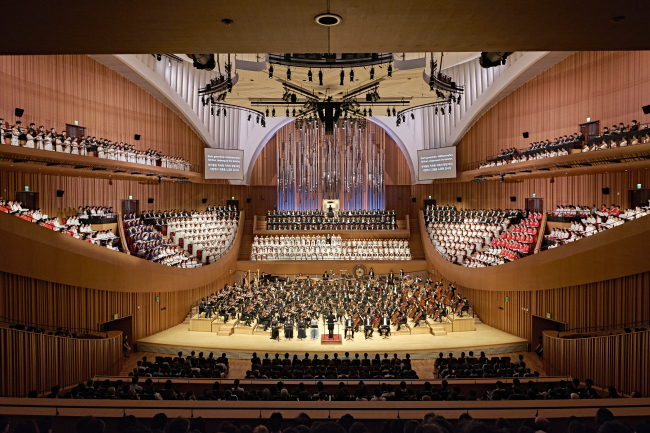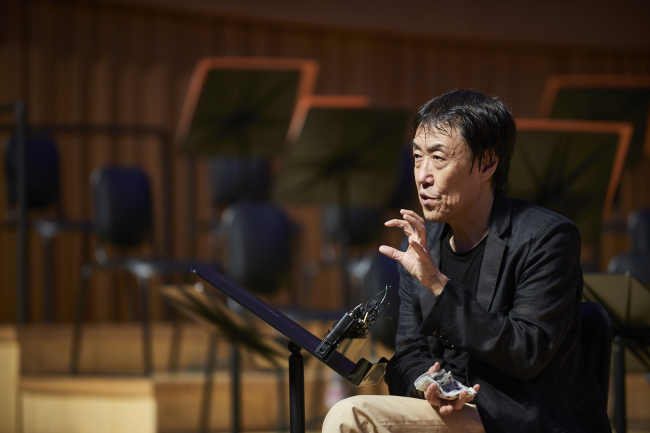Upon hearing about the choir’s careless preparation for the world premiere of his Eighth Symphony, Austrian composer Gustav Mahler, known for his drive for perfection, threatened to cancel the entire performance.
Presenting the same vast work at the Lotte Concert Hall last Thursday, conductor Lim Hun-joung proved himself a worthy heir of Mahler’s demand for excellence.
Bringing together eight soloists, the 141-member Korean Symphony Orchestra, and 850 choral members under his baton, Lim introduced the masterpiece in its full, grand scale.
 |
Eight soloists and 19 choir groups perform Gustav Mahler’s “Symphony of a Thousand” under conductor Lim Hun-joung at Lotte Concert Hall in Seoul on Thursday. (Lotte Concert Hall) |
This was his third time conducting the piece, yet his first with an ensemble of a thousand vocalists and instrumentalists -- a feat only attempted a handful of times in the symphony’s 106-year history.
“The more you perform, the more opportunities you have for filling in the gaps with new discoveries,” said Lim at a press rehearsal held at the Lotte Concert Hall in southeastern Seoul last Wednesday. “With repetition comes clarification and understanding of the structure, which is the foundation for beauty.”
Nicknamed the “Symphony of a Thousand” against the composer’s wishes, the 80-minute piece premiered at the Neue Musik-Festhalle in Munich, Germany, in 1910, where Mahler recruited over 1,000 performers, including 171 musicians and 858 singers.
After two weeks of being “haunted by the specter of failing inspiration,” Mahler found himself under the influence of a spiritual muse that gifted him the melody for the 9th century Latin hymn “Veni Creator Spiritus” (“Come, Creator Spirit”), which became the first movement of what turned out to be his Eighth Symphony.
The music director and chief conductor of the Korean Symphony Orchestra, Lim is no stranger to Mahler.
 |
Music director and chief conductor of the Korean Symphony Orchestra, Lim Hun-joung (Lotte Concert Hall) |
From 1999 to 2003, the 62-year-old maestro conducted the complete works of Mahler with the Bucheon Philharmonic Orchestra, ultimately sparking the “Mahler Syndrome” in Korea that had already made its way throughout Europe and the US decades ago.
However, Lim’s reason for opening up Korea’s eyes and ears to Mahler’s repertoire was not one driven by “a sense of duty.”
“I did it because the wonderful works of a composer called Mahler exist ... just because I wanted to,” said Lim in an interview with a local media outlet in 2007.
On Friday, Lim opened the two-part symphony with a powerful commencement of “Veni Creator Spiritus,” which then proceeded with even more vigor. Balancing out the intensity, the children’s choirs invigorated the centuries-old hymn with a certain youthfulness.
Unlike the first movement, the second part -- derived from closing passages from Goethe’s 19th century German poem Faust -- presented a delicate beginning that had the audience holding their breath. Closing the night with just as much commitment as the start, Lim and his ensemble demonstrated unfaltering harmony.
A seemingly contradicting union of opposing texts -- one spiritual and Latin, and the other secular and German -- was tied with an overarching motif of love and serenity.
“In an orchestra, it’s crucial to align everyone’s mind and heart in one place,” said Lim. “In the era of artificial intelligence and AlphaGo, I want this performance to embody the triumph of humanity.”
By Kim Yu-young (
ivykim@heraldcorp.com)









![[Today’s K-pop] Blackpink’s Jennie, Lisa invited to Coachella as solo acts](http://res.heraldm.com/phpwas/restmb_idxmake.php?idx=644&simg=/content/image/2024/11/21/20241121050099_0.jpg)